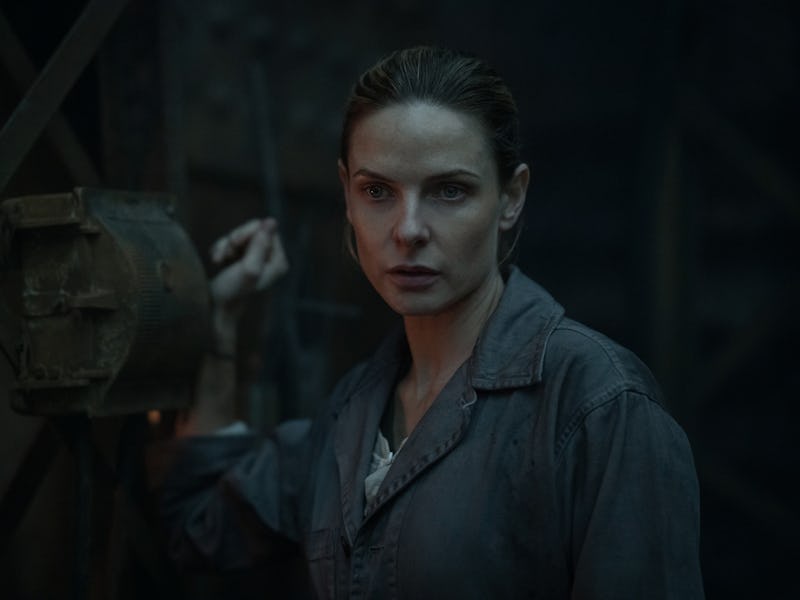Apple's Epic New Sci-Fi Show Might Not Have Happened If It Wasn't For Rebecca Ferguson
Ferguson initially passed on the Apple TV+ show. Then she became executive producer.

Before it had even gotten started, Apple TV’s new post-apocalyptic series Silo almost lost its best asset: its star, Rebecca Ferguson.
The Dune star initially passed on the role of protagonist Juliette, showrunner Graham Yost revealed. “I got on a Zoom with Morten [Tyldum,] who directed the first three episodes, and her,” he tells Inverse. “We thought we were winning and charming and we thought we had her. And then we heard that she said no.”
Ferguson herself admits it wasn’t love at first sight. “I read six episodes or something like that, and at the beginning worked, and a couple of episodes later on I was like, ‘I'm not sensing it. It's losing something here. It’s just not just ticking with me,’” she tells Inverse. “I don't want to dedicate my life to what can possibly be a continuous series if I don't love it.”
But according to Yost, she kept asking her agent about the role, so they arranged another meeting. “They asked, ‘Well, what are your notes?’ I sat down and I did all the notes and I sent them in,” Ferguson says. “They did a complete change on a couple of the episodes and they sent it back to me and it completely made sense.” From then on, Rebecca Ferguson was Juliette. This simple moment of spontaneous collaboration highlights the level of cooperation that ripples throughout this series.
Rebecca Ferguson as Juliette in Silo.
Silo follows a society that lives completely underground in a silo after some long-forgotten event. Juliette, once a mechanical worker, finds herself at the center of a huge mystery that calls the very existence of the silo into question. It’s a tale of people daring to ask questions, challenge authority, and help each other — which is just what these creatives did.
“I saw how quickly they were to collaborate on things and it made it better, my ideas, but also their ideas on my ideas. It became this sort of continuation of creativity,” Ferguson says. Because of these notes, she was given executive producer credit on the series.
Ferguson’s experience on another sci-fi novel adaptation seems like it might have helped her shape the show, but the actress is quick to point out the differences between Juliette and her Dune character, Lady Jessica. “They're different human beings. We have one person who is forced underground and has lived in a civilization underground for 200 years. She's a mechanic. The other one is somewhat super — she’s a bodyguard, semi goddess, with her powers and her belief in herself as a Bene Gesserit.”
Science fiction is clearly becoming a habit for her, but she doesn’t seek out these strange worlds in particular. “In Dune, we are on different planets, but for me, it's a film between characters and the power, and greed and protection and fierce loyalty and betrayal,” she says. “That's what I'm interested in.”
Director Morten Tyldum, Hugh Howey, Rebecca Ferguson, Graham Yost and Apple TV+’s Jamie Erlicht at the Silo premiere.
Ultimately, if there was one shared commonality that drew Ferguson to the Dune and Silo, it’s that both of them are the “thinker’s” sci-fi. Ferguson had much praise for author Hugh Howey, whose novel Wool would form the basis for Silo. “He constantly talks of juxtaposition, of power versus truth versus reality versus fiction,” Ferguson says.
Wool started off as an Amazon self-published novel that Howey just “tossed on the Kindle store for 99 cents,” he tells Inverse. “It was very cathartic for me to write and very emotional and personal,” Howey says. But it wasn’t intended to be anything more than a pit stop on the way to his next novel. But before he could finish that next novel, Wool had taken off. The sudden popularity “demanded me to write more in this series and finish out the book.”
Wool became a huge hit, and while much of the story survived to the series, the title did not. “We love the title Wool. It looks great on the book cover, it looked great on posters that we had done, but it's hard to say and it's hard to hear,” Yost says.
The path to production has not been easy for Silo. The title had to be changed, the star almost backed out, and a massive set had to be built in a warehouse in London. But through each obstacle, the final project has only gotten better. Ferguson’s notes made the script more cohesive, the new title rolls off the tongue, and the gritty industrial look of the set only makes the world feel more real.
“It's fun to be a part of something where everyone's pulling in the same direction,” Graham Yost says, “Which is, ‘Let's do these books and do them right.’”